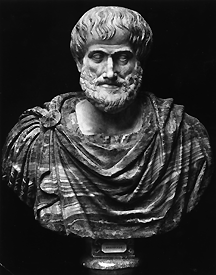Aristoteles |
Aristoteles is known as a very important philosoph. He was also one of the greatest biologists of the ancient times. When Plato died, in 347 BC, Aristoteles left the Academy. In 342 BC he was called to Macedon by the king Phillip II. There Aristoteles was the tutor of Alexander, the son of Philip II, later Alexander the Great. When Phillip II was assassinated, in 336 BC, Aristoteles returned to Athens, where he founded his own school, named the Lyceum. Aristoteles died at Chalcis in 322 BC. The main contributions of Aristoteles to biology where: • Plato teached that ultimate reallity is located in ideas, knowable only by reason, while Aristoteles believed that reallity is located in physical objects, knowable through experience. This Aristoteles believe is one of the science basis. • Aristoteles was an extraordinary zoologist, dissecting and describing the anatomy of octopus, crustaceans and other invertebrates. Also, he described the embryological development of the chicken, the stomach of ruminants and the social organization of bees. • Aristoteles tried to classify living things and constructed a very reasonable classification, not overcomed in more than 2000 years. He distingished between plants and animals, and between blooded animals (vertebrates) and bloodless animals (invertebrates). He showed that cetaceans had placenta and where not fishes. Also, he showed that cnidarians where animals and not plants. Of course, 2300 years later, we know that some of Aristoteles ideas where wrong. For example, he believed that heart was the center of life, and that brain was merely a cooling organ for the blood, or that simple organisms could form spontaneously from non living material. These mistakes are little in front of his big contributions to science. More information:
|
 Aristoteles was born at Stagira (Greece) in 384 BC. His father had been physician in the macedonian court. At age 17, he went to Athens and became a student at Plato's Academy. There Aristoteles was a very brilliant student and, in few years, a teacher, but he opposed some of Plato's teachings.
Aristoteles was born at Stagira (Greece) in 384 BC. His father had been physician in the macedonian court. At age 17, he went to Athens and became a student at Plato's Academy. There Aristoteles was a very brilliant student and, in few years, a teacher, but he opposed some of Plato's teachings.